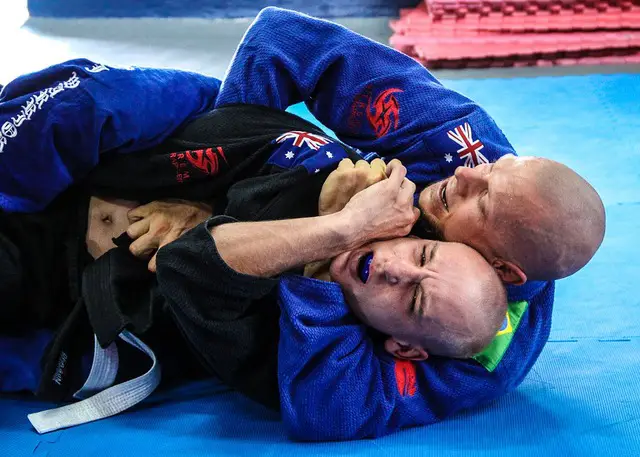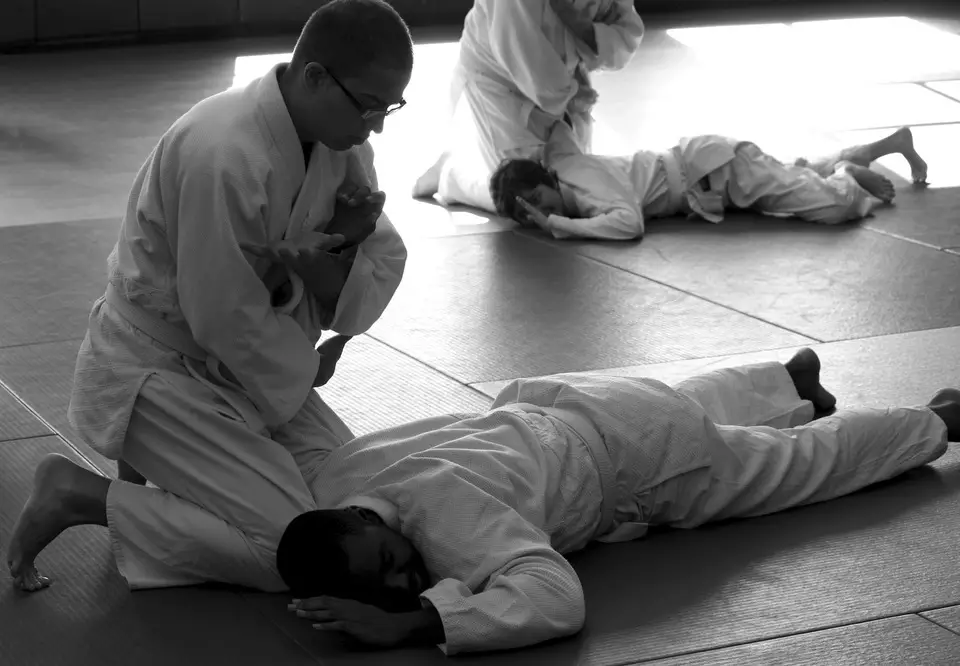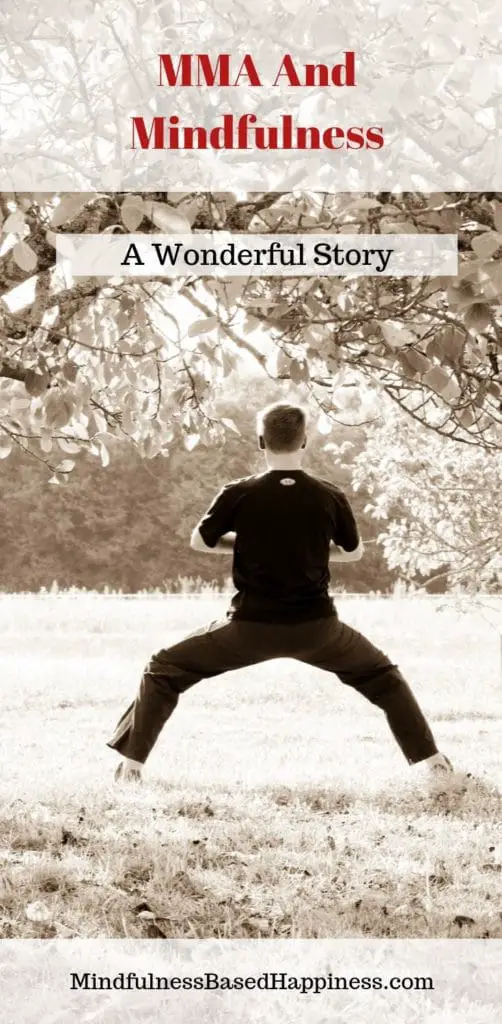Mixed Martial Arts – A Path to Mindfulness?
This article is a guest post by Christopher Walkling.
I expect I may encounter some difficulty, dear Reader, in convincing you of the relationship between Mindfulness and Mixed Martial Arts.
How does fighting another human-being have anything to do with peace of mind & presence in moment?
At a stretch, we might agree on some common-ground between Mindfulness and ‘traditional’ (non-combat) martial arts.

You may picture images of shaven-headed apprentices in remote Shaolin temples, eyes focused in deep states of meditation, drilling flurries of punches & kicks against wooden dummies. Monks in flowing robes flawlessly executing Katas inside spotless Dojos.
But what images come to mind when I ask you to picture a Mixed Martial Arts Gym?
Perhaps some kind of mini Roman amphitheatre; survival-of-the-fittest played out in real time?
The weak helplessly preyed upon by the strong. Pure primal-fury unleashed by ultra-violent bullies (all jacked-up on testosterone, of course), unchaining the worst sides of their animal-nature within the sweat-stained four walls of some underground MMA ‘cave’. A throwback to a more violent nature we thought we left behind a long time ago… somewhere between inventing the wheel and discovering fire, perhaps.
And while it is sweaty (it’s definitely sweaty), the rest is (mostly…) stereotype.
I’ve practised Mindfulness for close to 10 years. In July 2018, I started training and competing in the combat-sport of BJJ.
(For the unfamiliar – Brazilian Jiu Jitsu).
The fact is, I am shocked each time I enter a new BJJ gym at the immediate welcoming I receive (even as a lowly white-belt).
Far from the stereotypes of ego-fueled, violence-loving cavemen, the typical BJJ practitioner is defined by a single characteristic; humility (especially, the higher the rank). Progression in the sport is difficult and incredibly humbling. Anyone with an inflated-ego is a prime candidate for an early drop-out. Only those able to put their pride aside, are able to progress.
In fact, many practitioners are middle-aged, mow-the-lawn, family men with kids. And, increasingly, memberships at BJJ gyms are held by women. In many gyms, seeing a class-ratio of 50/50 male to female is quite regular.
Of course, modern Martial Artists aren’t always the picture of humility & good behaviour. But the typical reality is certainly a world-away from the exaggerations of the Media.
Don’t let the hyped-up trash-talking of UFC media conferences convince you otherwise. In thousands of towns and cities across the world, Brazilian Jiu Jitsu is quietly transforming the lives of anyone who is humble enough to step through its academies’ doors.
Now, even if I’ve succeeded in opening your mind to the personality-profile of a BJJ practitioner, your question likely remains; “But what has this got to do with Mindfulness..?”
Well, I believe that the act of training a combat sport, and live-sparring in particular, is an act of Mindfulness.

Let me explain:
As a beginner, I often find myself put into positions by my opponent which are… less than comfortable.
For example, I may find myself flat on my back, or curled up in a semi-foetal Turtle position, with my opponent mounted on top of me. From this vantage-point, he or she can select from an arsenal of techniques to ‘submit’ me, ranging from strangle-holds to arm-locks.
(NB. In sparring, one taps to stop the submission before it ever actually gets that far. Unless of course… you fancy being choked unconscious or having your arm broken).
But when placed in this position, my natural reaction is to panic. To thrash around. Flail my arms and legs in an attempt to free myself from the discomfort of the situation. This of course, only renders me more vulnerable to my opponent, who snatches my flailing arms and secures the submission easily.
Here’s where the practise of mindfulness comes in:
Slowly slowly, I am learning. Instead of defaulting to an emotional reaction, I look to maintain a calm awareness of the situation. An acceptance of the pressure. Rather than fight the discomfort of the situation, I resolve to accept it, therefore allowing me to focus on the more important task — fighting the person on top of me
It’s only after achieving this state of acceptance, that I’m actually able to formulate a rational plan of escape.
And so, instead of flailing my arms out, I remember to keep them tucked in. Instead of thrashing my legs around helplessly, I monitor my opponent’s movements. I wait for the opportunity to secure their arm, bridge my body, and sweep them off of me to free myself from the mount.
(Of course, as a 66kg beginner, I’m not always successful, no matter how calm my mind…)
But there is something powerful in the training of decoupling this knee-jerk, emotional reaction to an uncomfortable scenario or event. Here’s where I see not only the existence of Mindfulness in combat sports… but how this practise can have valuable application in everyday life.
In the past, whenever a ‘life-problem’ reared its head, my initial reaction was to flail around, much like my first sparring sessions. I’d thrash around emotionally. Time, energy and effort all wasted on bemoaning the existence of the problem, complaining at its unfairness, blaming this/that/the other for it. All the time while I was engaged in my own petty civil-war, the problem was gaining position on me. Always getting closer to the ‘submission’.

But much like the constant submissions (and I do mean constant) in my first sparring sessions have taught me, I’m slowly learning to appreciate the correct way to react & address these ‘opponents’ in life.
Rather than waste energy on emotional reaction, I try to accept the circumstances as quickly as possible. I acknowledge when life has ‘got ‘on top of me’. I strive for awareness of the predicament, without emotional reaction to it. I make peace with it. “It is what it is”.
Then, and only then, is my mind clear and sufficiently rational to actually solve the problem.
That has been one of the greatest gifts that the practise of Mindfulness and Modern Martial Arts has brought into my life. The regular honing of the skill to decouple from impulsive reaction, and replace it with a focus to pause, plan, problem-solve.
A valuable skill on the mats. A valuable skill for life.
Thanks for reading.
Featured image courtesy of Sebastien Wiertz.

Hi, I’m Olivier Devroede and I have been meditating seriously since 2009.
Due to the great benefits I have seen in meditating, I decided to become an MBSR trainer myself and start a blog.



